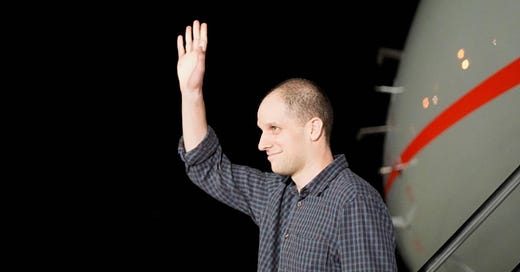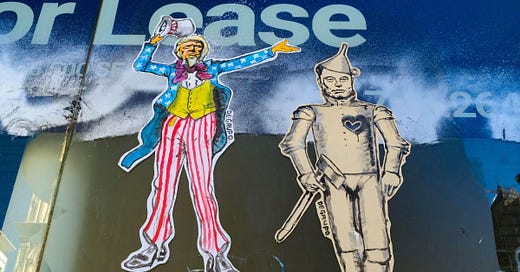
Discover more from REACTION
US and Russia complete biggest prisoner swap since end of Cold War
That such a major operation has taken place now, with relations between Russia and the US at one of their all time lows, is an extraordinary feat of diplomacy.
“Their brutal ordeal is over,” declared Joe Biden this evening, following news that 16 detainees, including Wall Street Journal reporter Evan Gershkovich, have been freed from Russia in the biggest and most complex prisoner swap since the end of the Cold War, writes Caitlin Allen.
This major deal, brokered in large part by Turkey, will free 24 prisoners in total. Russia and Belarus have agreed to release 16 foreign political prisoners and Russian dissidents in return for the release of Russian spies, hackers and one convicted criminal from the US, Slovenia, Norway and Germany.
That such a major operation has taken place now, against the backdrop of a full-scale war in Europe with relations between Russia and the US at one of their all time lows, is an extraordinary feat of diplomacy.
Aside from Gershkovich, other high-profile figures to be freed include Paul Whelan, a former US marine who was arrested in Russia in 2018 and handed a 16-year sentence for espionage.
Alsu Kurmasheva, a Russian-American journalist for Radio Free Europe who was sentenced to six years in prison on the same day as Gershkovich, convicted for violating Russian laws on “military fakes” in connection with a book she edited about Ukraine, has also been freed.
As has Vladimir Kara-Murza, the best known imprisoned Russian dissident following the death of Alexei Navalny. Kara-Murza, a Russian and British national, was serving a 25-year sentence in a Siberian penal colony after being convicted of treason for condemning Russia’s war in Ukraine. He suffers from a nerve condition after surviving two poisoning attempts in the 2010s.
Another Russian dissident to be freed is Ilya Yashin, a long time friend of Navalny’s. Yashin was jailed in December 2022 on charges of spreading “false information” about the Russian army, after speaking out on his YouTube channel about war crimes by Russian forces in the Kyiv suburb of Bucha.
While the newfound freedom of so many unjustly held prisoners is a cause for celebration, their release has come at a cost.
According to the WSJ, the thorniest parts of the secret negotiations was persuading a reluctant German government to release Russian hitman, Vadim Krasikov.
Krasikov, a Russian national, and former high-ranking FSB colonel, was serving a life sentence in a German prison for murdering an exiled Chechen-Georgian dissident in a Berlin park in 2019. A German judge accused Russia of state terrorism, saying the order to kill must have come from President Vladimir Putin himself.
During Putin’s February interview with US journalist Tucker Carlon, he hinted that Krasikov was the Russian prisoner he wanted swapped for Gershkovich. And the WSJ reports today that the fate of Krasikov was indeed crucial to securing Gershkovich’s release.
While the West may have gained more from this exchange on a pure numbers front, exchanging journalists for killers is the price to pay for doing a deal with Vladimir Putin.
We should spare a thought too for others not included in this swap, such as US teacher Marc Fogel, who are still rotting in a Russian jail. The US National Security Adviser Jake Sullivan also confirmed that it had been intended when negotiations began that the Russian opposition leader Alexey Navalny would be part of a swap. He was murdered in prison in February.
Despite these caveats, the mood today is undoubtedly one of relief. And for the Biden administration, this is a big win. Seeing Gershkovich, Whelan and Kurmasheva back on US soil has long been a goal of his presidency.
Subscribe to REACTION
Iain Martin and the team make sense of the news, providing commentary and analysis on the stories that matter in politics, geopolitics, economics and culture.












